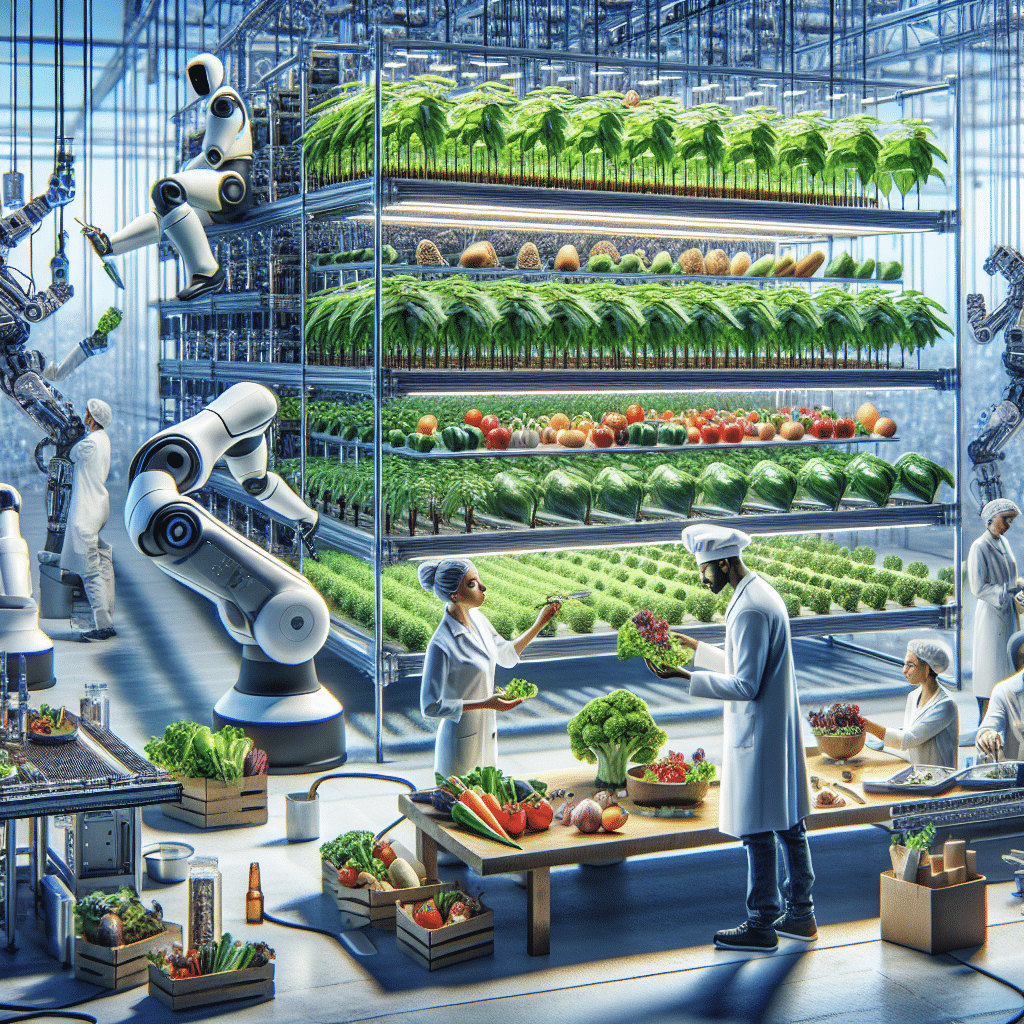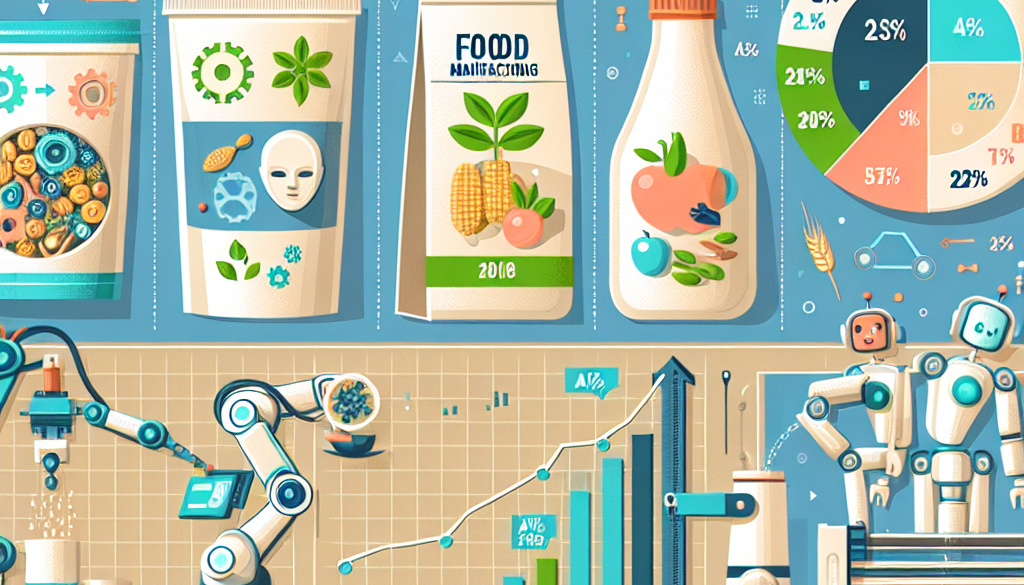Mega-Trends in Food Manufacturing
-
Table of Contents
- Mega-Trends Shaping the Future of Food Manufacturing
- 1. Sustainability and Ethical Sourcing
- 2. Plant-Based Alternatives
- 3. Health and Nutrition Focus
- 4. Technological Innovations
- 5. Personalization and Customization
- 6. Clean Label and Transparency
- 7. Global Flavors and Fusion Cuisine
- Conclusion
- ETprotein’s Protein Products: Meeting Today’s Food Manufacturing Trends
Mega-Trends Shaping the Future of Food Manufacturing

The food manufacturing industry is undergoing a transformation driven by several mega-trends that are reshaping the way food is produced, processed, and consumed. These trends are a response to changing consumer preferences, technological advancements, and the need for sustainable practices. In this article, we will explore the most significant trends in food manufacturing and how they are influencing the industry.
1. Sustainability and Ethical Sourcing
Consumers are increasingly concerned about the environmental impact of their food choices. This has led to a surge in demand for sustainably sourced and produced food items. Food manufacturers are responding by:
- Reducing carbon footprints through energy-efficient processes
- Implementing waste reduction programs
- Using sustainable packaging materials
- Ensuring ethical sourcing of raw materials
Statistics show that a significant percentage of consumers are willing to pay more for products that are sustainably produced, indicating the importance of this trend for the industry’s future.
2. Plant-Based Alternatives
The plant-based food sector is booming, with a growing number of consumers adopting vegetarian, vegan, or flexitarian diets. Food manufacturers are capitalizing on this trend by:
- Developing plant-based alternatives to meat, dairy, and eggs
- Investing in research to improve taste and texture
- Expanding product lines to include a variety of plant-based options
Market research indicates that the plant-based food market is expected to grow exponentially in the coming years, making it a key area for innovation and investment.
3. Health and Nutrition Focus
There is a growing awareness of the link between diet and health, leading consumers to seek out foods that offer nutritional benefits. Food manufacturers are responding by:
- Fortifying foods with vitamins, minerals, and other nutrients
- Reducing sugar, salt, and unhealthy fats in products
- Creating functional foods that support health and wellness
Statistics show that the global functional foods market is on the rise, highlighting the importance of health-focused products in the food manufacturing industry.
4. Technological Innovations
Advancements in technology are revolutionizing food manufacturing processes. Key innovations include:
- Automation and robotics for increased efficiency and safety
- Artificial intelligence for supply chain optimization and predictive maintenance
- Blockchain for traceability and transparency
- 3D food printing for customized nutrition and designs
Investment in food tech startups has surged in recent years, demonstrating the industry’s commitment to embracing new technologies.
5. Personalization and Customization
Consumers are seeking products tailored to their individual preferences and dietary needs. Food manufacturers are adapting by:
- Offering customizable product options
- Utilizing data analytics to understand consumer behavior
- Developing personalized nutrition plans based on genetic profiles
With the rise of e-commerce and digital platforms, the ability to offer personalized products is becoming a competitive advantage for food manufacturers.
6. Clean Label and Transparency
The demand for clean label products—those with simple, natural ingredients—is growing. Consumers want to know what is in their food and where it comes from. Manufacturers are responding by:
- Reducing the number of artificial additives in products
- Providing clear and comprehensive product information
- Emphasizing the origin and story behind ingredients
Research indicates that clean label products are perceived as healthier and more trustworthy, making transparency a key factor in consumer decision-making.
7. Global Flavors and Fusion Cuisine
As global travel and cultural exchange increase, consumers are becoming more adventurous with their food choices. This has led to a rise in demand for international flavors and fusion cuisine. Food manufacturers are meeting this demand by:
- Introducing new and exotic flavors to the market
- Incorporating global ingredients into traditional products
- Creating fusion products that blend different culinary traditions
Statistics show that ethnic foods are one of the fastest-growing segments in the food industry, reflecting the diverse tastes of modern consumers.
Conclusion
The food manufacturing industry is at a pivotal point, with mega-trends such as sustainability, plant-based alternatives, health and nutrition, technological innovation, personalization, clean label, and global flavors shaping its future. These trends are not only influencing consumer preferences but also driving manufacturers to adapt and innovate. By embracing these trends, food manufacturers can ensure their products meet the evolving demands of the market and contribute to a more sustainable and health-conscious food system.
ETprotein’s Protein Products: Meeting Today’s Food Manufacturing Trends
ETprotein is at the forefront of providing high-quality protein products that align with the current mega-trends in food manufacturing. Their range of organic bulk vegan proteins, including rice, pea, and various seed proteins, caters to the growing demand for plant-based and health-focused food options. With a commitment to sustainability, non-GMO, and allergen-free attributes, ETprotein’s offerings are ideal for manufacturers looking to innovate and meet consumer expectations. For more information or to sample their products, please contact them and email sales(at)ETprotein.com today.
About ETprotein:
ETprotein, a reputable protein and L-(+)-Ergothioneine (EGT) Chinese factory manufacturer and supplier, is renowned for producing, stocking, exporting, and delivering the highest quality organic bulk vegan proteins and L-(+)-Ergothioneine. They include Organic rice protein, clear rice protein, pea protein, clear pea protein, watermelon seed protein, pumpkin seed protein, sunflower seed protein, mung bean protein, peanut protein, and L-(+)-Ergothioneine EGT Pharmaceutical grade, L-(+)-Ergothioneine EGT food grade, L-(+)-Ergothioneine EGT cosmetic grade, L-(+)-Ergothioneine EGT reference grade and L-(+)-Ergothioneine EGT standard. Their offerings, characterized by a neutral taste, non-GMO, allergen-free attributes, with L-(+)-Ergothioneine purity over 98%, 99%, cater to a diverse range of industries. They serve nutraceutical, pharmaceutical, cosmeceutical, veterinary, as well as food and beverage finished product distributors, traders, and manufacturers across Europe, USA, Canada, Australia, Thailand, Japan, Korea, Brazil, and Chile, among others.
ETprotein specialization includes exporting and delivering tailor-made protein powder and finished nutritional supplements. Their extensive product range covers sectors like Food and Beverage, Sports Nutrition, Weight Management, Dietary Supplements, Health and Wellness Products, and Infant Formula, ensuring comprehensive solutions to meet all your protein needs.
As a trusted company by leading global food and beverage brands and Fortune 500 companies, ETprotein reinforces China’s reputation in the global arena. For more information or to sample their products, please contact them and email sales(at)ETprotein.com today.














